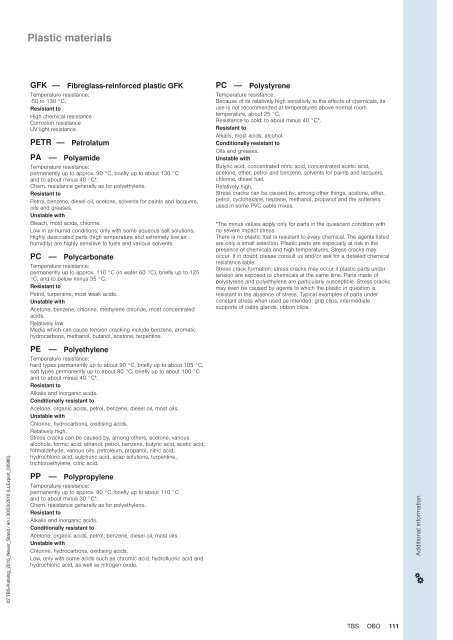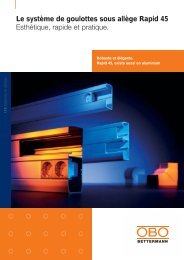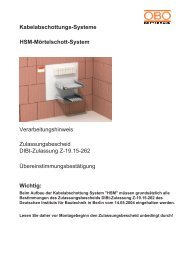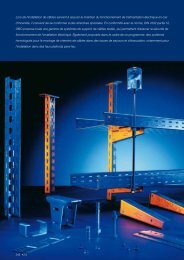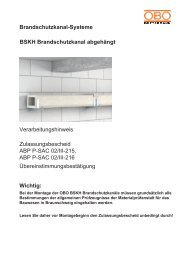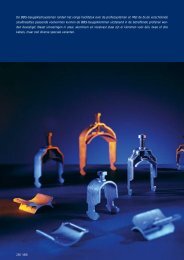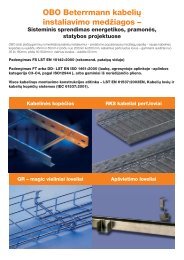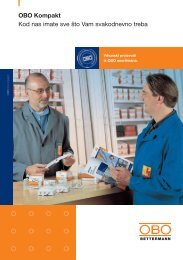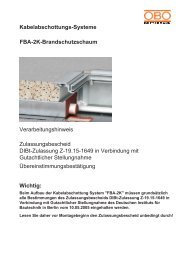Data and information technology - OBO Bettermann
Data and information technology - OBO Bettermann
Data and information technology - OBO Bettermann
You also want an ePaper? Increase the reach of your titles
YUMPU automatically turns print PDFs into web optimized ePapers that Google loves.
Plastic materialsGFK—Temperature resistance:-50 to 130 °C.Resistant toHigh chemical resistanceCorrosion resistanceUV light resistancePETRPA——Fibreglass-reinforced plastic GFKPetrolatumPolyamideTemperature resistance:permanently up to approx. 90 °C, briefly up to about 130 °C<strong>and</strong> to about minus 40 °C*.Chem. resistance generally as for polyethylene.Resistant toPetrol, benzene, diesel oil, acetone, solvents for paints <strong>and</strong> lacquers,oils <strong>and</strong> greases.Unstable withBleach, most acids, chlorine.Low in air-humid conditions; only with some aqueous salt solutions.Highly desiccated parts (high temperature <strong>and</strong> extremely low airhumidity) are highly sensitive to fuels <strong>and</strong> various solvents.PC—PolycarbonateTemperature resistance:permanently up to approx. 110 °C (in water 60 °C), briefly up to 125°C, <strong>and</strong> to below minus 35 °C.Resistant toPetrol, turpentine, most weak acids.Unstable withAcetone, benzene, chlorine, methylene chloride, most concentratedacids.Relatively low.Media which can cause tension cracking include benzene, aromatichydrocarbons, methanol, butanol, acetone, terpentine.PC—PolystyreneTemperature resistance:Because of its relatively high sensitivity to the effects of chemicals, itsuse is not recommended at temperatures above normal roomtemperature, about 25 °C.Resistance to cold: to about minus 40 °C*.Resistant toAlkalis, most acids, alcohol.Conditionally resistant toOils <strong>and</strong> greases.Unstable withButyric acid, concentrated nitric acid, concentrated acetic acid,acetone, ether, petrol <strong>and</strong> benzene, solvents for paints <strong>and</strong> lacquers,chlorine, diesel fuel.Relatively high.Stress cracks can be caused by, among other things, acetone, ether,petrol, cyclohexane, heptane, methanol, propanol <strong>and</strong> the softenersused in some PVC cable mixes.*The minus values apply only for parts in the quiescent condition withno severe impact stress.There is no plastic that is resistant to every chemical. The agents listedare only a small selection. Plastic parts are especially at risk in thepresence of chemicals <strong>and</strong> high temperatures. Stress cracks mayoccur. If in doubt, please consult us <strong>and</strong>/or ask for a detailed chemicalresistance table.Stress crack formation: stress cracks may occur if plastic parts undertension are exposed to chemicals at the same time. Parts made ofpolystyrene <strong>and</strong> polyethylene are particularly susceptible. Stress cracksmay even be caused by agents to which the plastic in question isresistant in the absence of stress. Typical examples of parts underconstant stress when used as intended: grip clips, intermediatesupports of cable gl<strong>and</strong>s, ribbon clips.02 TBS-Katalog_2010_Neuer_St<strong>and</strong> / en / 30/03/2010 (LLExport_00986)PE—PolyethyleneTemperature resistance:hard types permanently up to about 90 °C, briefly up to about 105 °C,soft types permanently up to about 80 °C, briefly up to about 100 °C<strong>and</strong> to about minus 40 °C*.Resistant toAlkalis <strong>and</strong> inorganic acids.Conditionally resistant toAcetone, organic acids, petrol, benzene, diesel oil, most oils.Unstable withChlorine, hydrocarbons, oxidising acids.Relatively high.Stress cracks can be caused by, among others, acetone, variousalcohols, formic acid, ethanol, petrol, benzene, butyric acid, acetic acid,formaldehyde, various oils, petroleum, propanol, nitric acid,hydrochloric acid, sulphuric acid, soap solutions, turpentine,trichloroethylene, citric acid.PP—PolypropyleneTemperature resistance:permanently up to approx. 90 °C, briefly up to about 110 °C<strong>and</strong> to about minus 30 °C*.Chem. resistance generally as for polyethylene.Resistant toAlkalis <strong>and</strong> inorganic acids.Conditionally resistant toAcetone, organic acids, petrol, benzene, diesel oil, most oilsUnstable withChlorine, hydrocarbons, oxidising acids.Low, only with some acids such as chromic acid, hydrofluoric acid <strong>and</strong>hydrochloric acid, as well as nitrogen oxide.Additional <strong>information</strong>TBS<strong>OBO</strong>111


